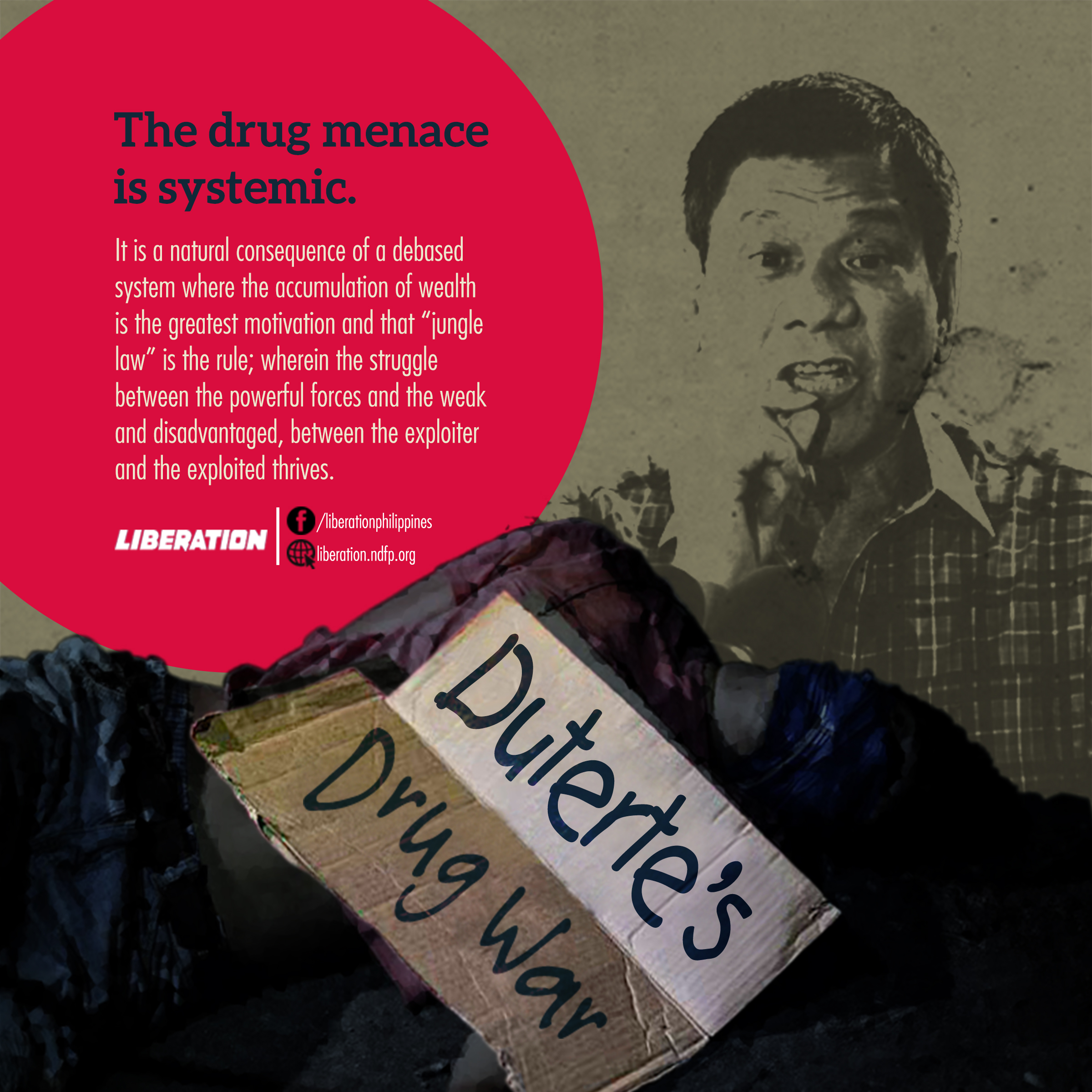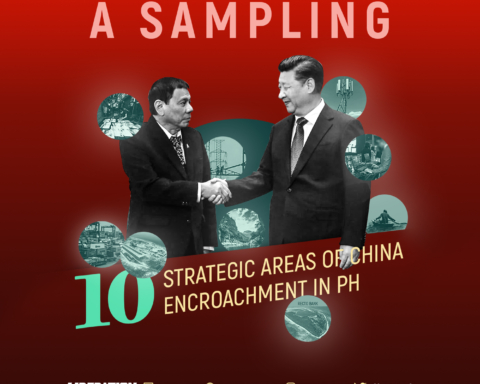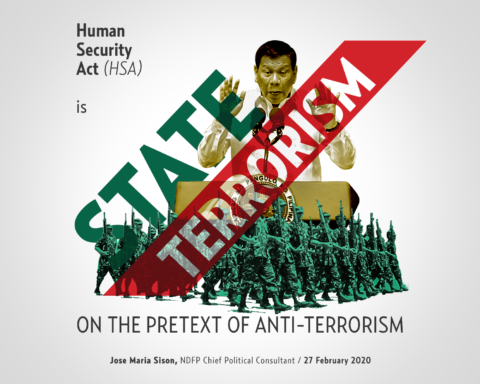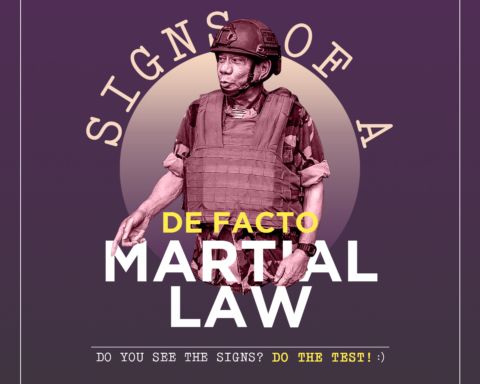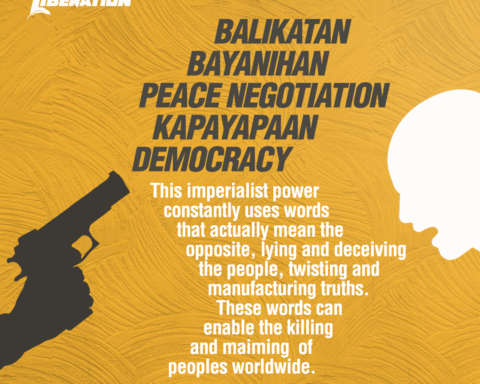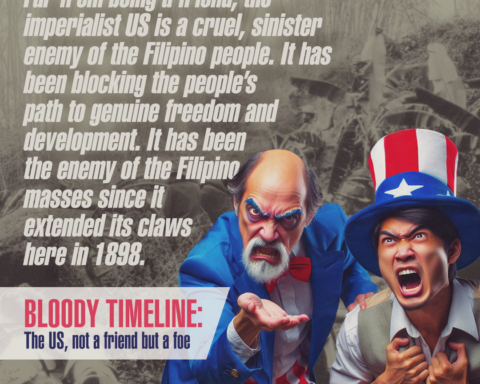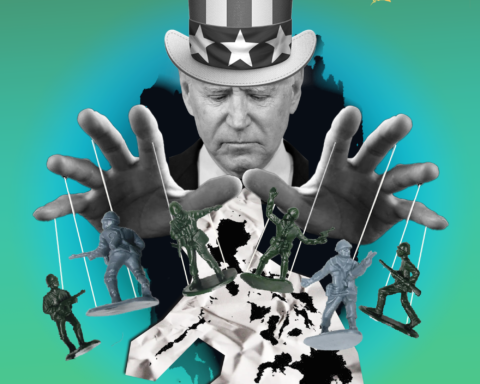Duterte’s Drug War: Via Body Count or the People’s Movement
by Pat Gambao
The death toll on President Duterte’s “war on drugs” has risen to astronomic proportions that it has astounded and shaken the nation. Even the capitalist world, cloaking its hyprocrisy on human rights, has raised alarm over the extrajudicial killings.
More than 12,000 have been killed both in police operations and vigilante handiwork — only 3,811 cases were grudgingly attributed to the police. Photos of cadavers have been shown, strewn beside each a gun, sachets of shabu (crystal methamphetamine hydrochloride, the poor man’s cocaine) and in some cases paper bills to portray a buy-bust operation. In vigilante killings, the victims’ bodies were invariably hogtied, heads covered with packaging tapes with warnings that read “Pusher ako, huwag tularan” (I am a pusher, don’t emulate me).
The horrendous killings, occurring mostly in urban poor communities, have raised alarm and outrage, nationally and internationally. Most infuriating is the way the government and police authorities have been dismissing the deaths of apparently innocent poor civilians as mere “collateral damage”.
Most sickening is the story about a mother suspected of being a pusher-user. She was breastfeeding her baby in their humble abode when the executioners came. After taking the baby away from her and handing it to her 11-year child, they mercilessly shot the mother to death.
Many such ruthless extrajudicial killings of merely suspected addicts or pushers among the poor have piled up. Duterte’s war on drugs has been shown up as a war against the poor, whereas so many identified drug lords have been given a chance to defend themselves or to flee.
Due to public sympathy and the clear evidence, the killing of a 17-year old student, Kian de los Santos, created uproar that the authorities were hard put to dismiss. Son of an overseas Filipino worker (OFW) employed as a domestic helper in Saudi Arabia, the boy had not seen his mother for three years. The police’s claim that he had a gun and fired at them was belied by the closed-circuit television (CCTV) footage and neighborhood witnesses.
Kian’s case substantiated, if not reinforced, the long-held public belief that “planting of evidence” is a standard operating procedure (SOP) among state security forces to pin down and physically exterminate their victims with impunity.
Eradicating drug trafficking and addiction was Duterte’s campaign promise when he ran for the presidency in May 2016. He set a six-month timetable. But he reneged on his promise after seeing the four million people in a supposedly narco-list handed to him by his cohorts. He admitted that six months wouldn’t be enough to end the drug plague, not even his full six-year term as president. After the police force in Bulacan killed 32 drug suspects in a day, however, Duterte nonchalantly mused that if 32 would be the daily death toll for drug offenders, then maybe the war on drugs could rid the country of “what ails it.”
Duterte should stop dreaming and open his eyes to what really ails this country. The drug menace is systemic. It is a natural consequence of a debased system where the accumulation of wealth is the greatest motivation and that “jungle law” is the rule; wherein the struggle between the powerful forces and the weak and disadvantaged, between the exploiter and the exploited thrives. It is the greed of the exploiter versus the impoverishment of the exploited. In this sense, the fight against drugs can be deemed a class struggle.
Weapon for colonization and imperialist hegemony
The drug menace is a global social illness dating from the era of colonialism and capitalist trade. The Opium War of 1839 broke out due to the British trading of opium into China to earn more silver for its colonization of islands in Asia. The drug had doped a large number of the populace and corrupted Chinese officials who were bribed to give way to the smuggling of the drug. China lost in that war and Hong Kong was annexed to Britain.
Since that victorious war of Britain, narcotic drugs have been conveniently used to dope people and subjugate them. Capitalism up to its highest stage of imperialism has immensely profited from plying the trade. It has facilitated the creation of puppet officials, promoted bureaucratic capitalism through bribery, patronage or intimidation. It was used to quell resistance, conquer nations and control and enslave peoples using narcotic drugs as one of their subtle, secret weapons.
The production and trafficking of addictive dr
ugs is a multi-million-dollar business of big-time capitalists who have ties throughout the US government, the Central Intelligence Agency (CIA) and state security forces. Huge amount of foreign aid, purportedly to fight drugs, actually goes to quashing people’s rebellion and has been provided to groups, usually state security forces which themselves are involved in large-scale drug trafficking.
In exchange for Panama president General Manuel Noriega’s covert anti-insurgency work in Nicaragua and Latin America, the US imperialists provided him with hundreds of thousands of dollars while tolerating his drug trafficking activities. When this leaked out and Noriega became a liability to the US, the Drug Enforcement Administration finally indicted him. He was sentenced to 45 years in prison and his government was overthrown.
In the 1960s, the CIA bribed oppressed communities with heroine to pay for the US secret war in Laos.
The $3-Billion Merida Initiative Aid to Mexican security forces, with the pretext of fighting drug cartels, is used to suppress the Mexican people’s resistance against the plunder of their lands and resources by US business interests.
The Planned Colombia Program of the US government provided hundreds of millions of dollars a year for the war on drugs that actually went into fighting the Revolutionary Armed Forces of Colombia (FARC). Corrupt members of the Colombian army themselves have been accused of engaging in drug trafficking. The Colombian President Cesar Gaviria’s unsolicited advice to Duterte that the drug war is “unwinnable” and “disastrous”stems from his own failed war on drugs. For after the drug lord Pablo Escobar was killed by the police and the Medellin Cartel’s activities were ended, the cocaine industry in Colombia and the world persisted and prospered as a new drug cartel that has “more money, power and wider reach” took over.
The 2011 report of the Global Commission on Drug Policy gave this attestation: “The global war on drugs failed with devastating consequences for individuals and societies around the world.”
Bureaucrat capitalism
People in government take advantage of their positions to enrich themselves. The rotten system breeds greed. Thus it is not surprising that there are governors, mayors, legislators down to barangay officials who are either engaged in drug trafficking or stand as protectors. Generals, policemen, drug law enforcers, soldiers likewise instigate and protect the widespread proliferation of the drugs. No wonder the drug problem isn’t being solved.
Supply also seems to be inexhaustible. It is common knowledge that seized drugs get back into circulation as fast as, or even faster than the dying of the embers of the supposedly alum-substituted shabu crystals being incinerated for photo opportunities. According to reports, nine shabu laboratories have been raided and disabled to cut on the supply.
But, at the customs bureau, 650 kilos of shabu shipment worth Php 6.4 billion have passed scrutiny, landed in the agency’s “green” lane. Had there not been a tip from China, the source itself, the shipment could not have been apprehended. The actual volume that has slipped in to the “green” lane eluding inspection and reached the dope market is still undetermined.
The scandal opened the Pandora’s box, bringing to public scrutiny the corruption in the customs bureau that has long been kept under wraps, implicating even the president’s son, Davao City Vice Mayor Paolo Duterte, and son-in-law Manases Carpio, with the “Davao group”. A customs player under investigation for the drug smuggling spilled the beans on the nagging corruption in the bureau.
Worst, Duterte’s war on drugs has been used by unscrupulous policemen to further their criminal activities. Extortion, kidnapping for ransom, robbery, elimination of rival drug syndicates and assets, who may rat on them, are shrouded by the government’s anti-drug operations Tokhang (contracted term from the Visayan words toktok and hangyo meaning knock and plead) and ‘Double Barrel Reloaded’. Others, especially neophytes in the police force, do it to impress and bag promotions or awards. The ferocity of police operations springs from the orientation of the police as chief instrument for repression of an oppressive and exploitative state to preserve its power. For a corrupt law enforcement to handle the fight on drugs is indeed a travesty of options.
Drug trade and corruption at the New Bilibid Prison (NBP)
Sources at the NBP (names withheld) have stories to tell.
Confined at the NBP, the main penal facility of the national government, are big-time Chinese drug lords and their Filipino recruits to the drug trade. Recruitment is easy among inmates as the prospective returns are enticing. Incarcerated for criminal offenses other than drugs, the recruits rose to a new level that offered more money and privileges, just like what their Chinese co-inmates enjoy in prison.
From their cells, the drug lords continue to ply their lucrative business in the outside world using electronic devices such as cellphones, which they smuggled in or freely brought in for a fee. Seventy-five percent of the trade is done outside prison through accessories and henchmen who resolutely carry on the tasks of procurement, manufacture, trafficking and even eliminating rival syndicates or any other hindrance to the trade.
The inordinate corruption in the penitentiary enables the illicit trade to prosper. Some prison guards, gaters, custodial officers, escorts, sentry goals to the highest jail officials are, directly or indirectly, embroiled in the trade. The scandal in the NBP that exploded before the public’s eyes had implicated its directors and even the justice secretary.
Corruption in prison starts from pilferage of the prisoners’ food budget, supply provisions, electricity charges and graduates to the constant acceptance of enormous bribes for allowing undue privileges to inmates. Selective inspection on visitors becomes a norm. Thus, the proliferation of cell phones, kubol (literally, huts but these are spaces rented out to privileged inmates), drugs and other contrabands, including deadly weapons, is relentless. Thus drug dealers can operate freely in the confines of their cells.
Even when the NBP changed guards after the scandal broke out, the Special Action Forces (SAF) of the Philippine National Police got involved in the entry of cigarettes, a premium commodity in jail as this cost a fortune, P15.00-P50.00 per stick.
The illicit drug trade in the NBP did not stop at all as corruption persisted. It just lied low for a while then it slithered back with small-time Chinese drug lords in jail at the helm this time around while the big drug dealers waited for the opportunity to spring back to the trade.
Duterte’s anointed grand master of his war on drugs, General Ronald “Bato” de la Rosa will take over the reins at the NBP after his retirement from the Philippine National Police. We may expect tokhang inside prison or privileges for drug lords who are key witnesses against Duterte’s favorite nemesis.
The penitentiary under the existing debased system can never be a haven to rehabilitate offenders. It has only turned them worse.
Bureaucratic corruption extends to the courts where impunity is upheld. In many intances, drug offenders get away unpunished and manage to continue with their trade–for a fee. This is aside from the given flaws in the prevailing justice system. One of which is the way cases drag till kingdom come.
In sum, Duterte may succeed in killing all those drug lords, traffickers, peddlers, pushers, runners and users but that will not wipe out the plague and solve the problem. The drug menace will continue to rear its ugly head and spit out its venom to destroy human lives and society. Unless and until the roots of the problem is addressed-the abject poverty stemming from landlessness and absence of meaningful job opportunities for the toiling masses, the foreign domination and control of the economy, politics and culture of the Philippine society, the petrified corruption in the bureaucracy — President Duterte’s war on drugs will come to naught. It will fail, desperately.
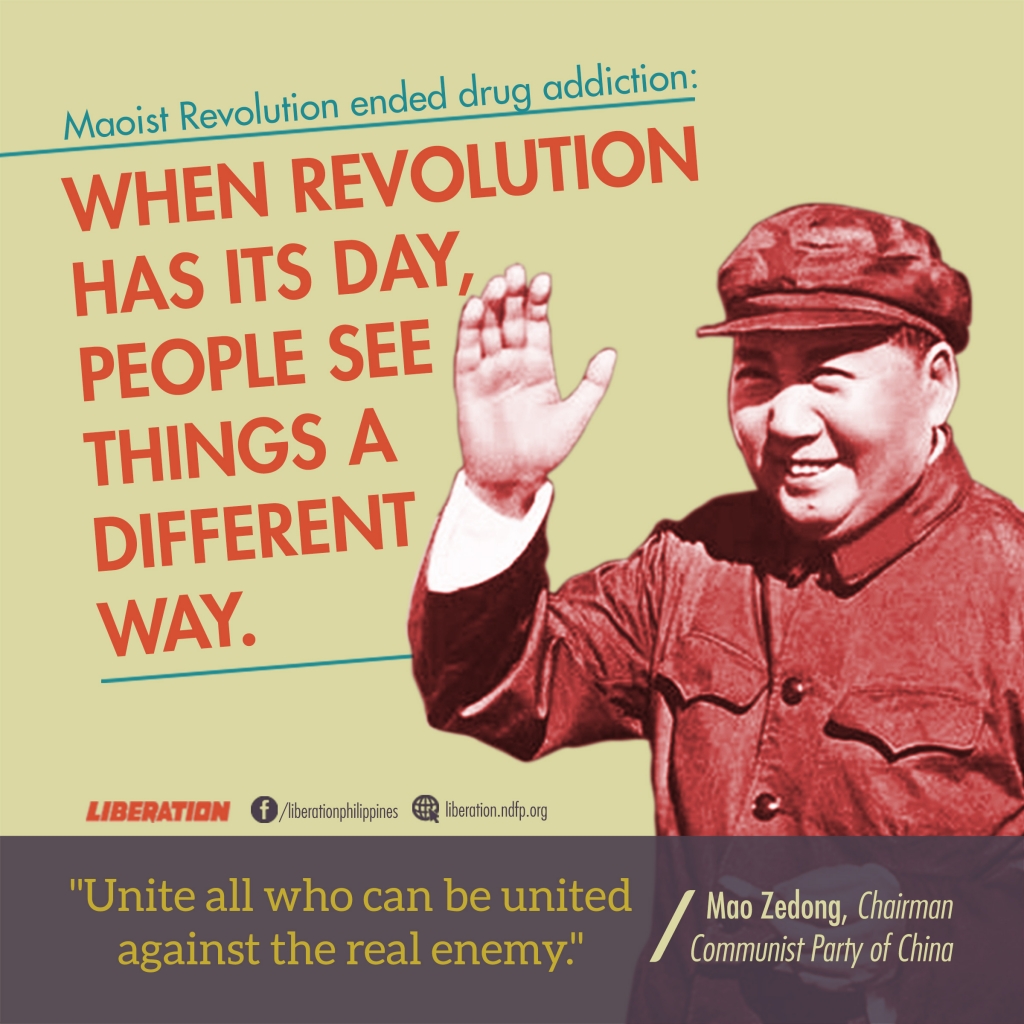
China’s Experience Under Mao
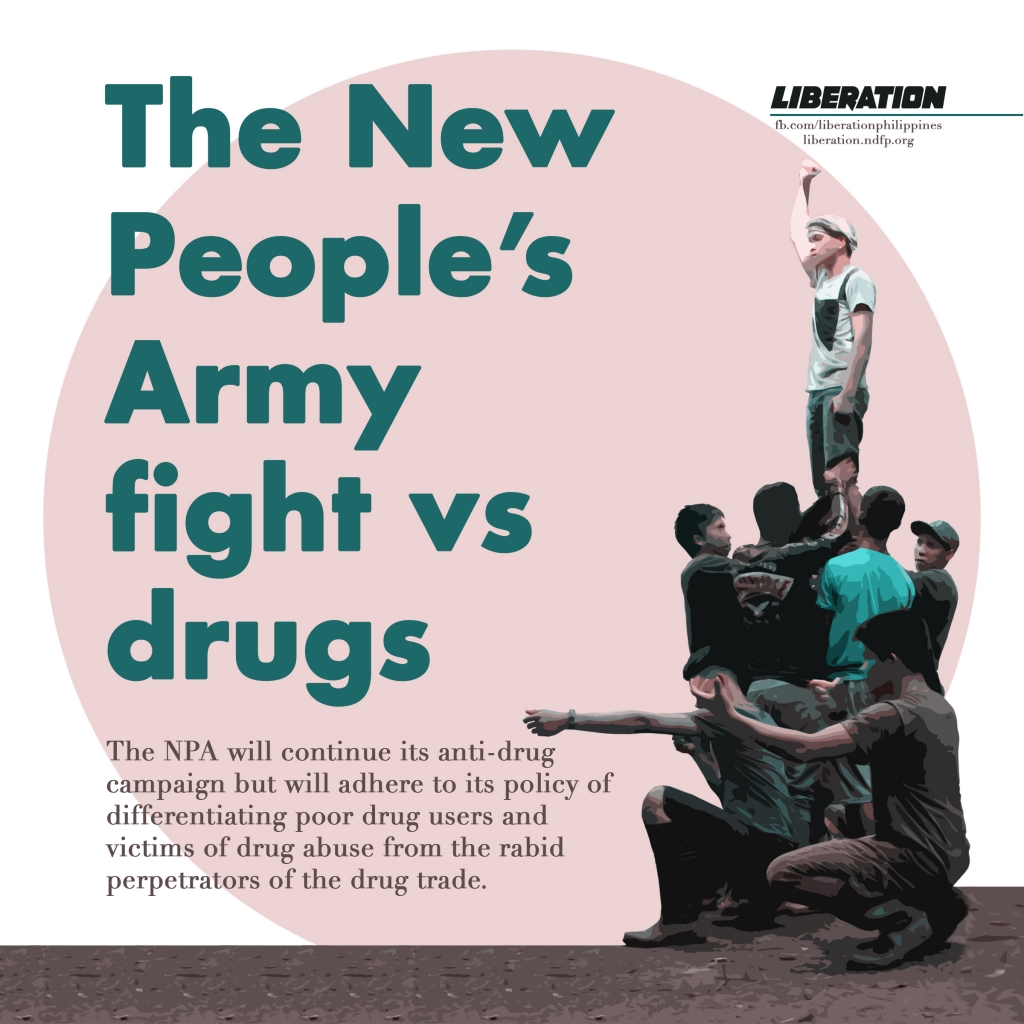
The New People’s Army Fight vs Drugs

